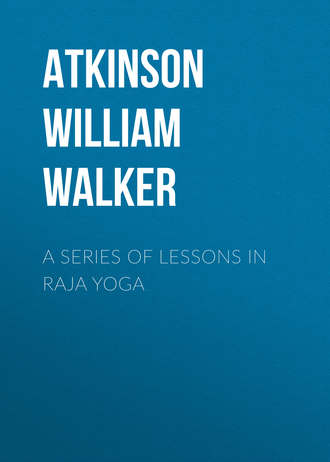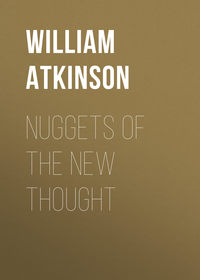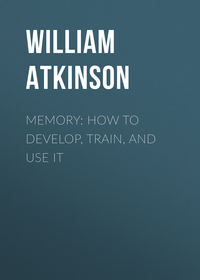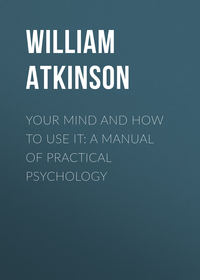 полная версия
полная версияA Series of Lessons in Raja Yoga
Hartmann calls our attention to a very important fact when he says: "The unconscious does not fall ill, the unconscious does not grow weary, but all conscious mental activity becomes fatigued."
Kant says: "To have ideas and yet not be conscious of them—therein seems to lie a contradiction. However, we may still be immediately aware of holding an idea, though we are not directly conscious of it."
Maudsley says: "It may seem paradoxical to assert not merely that ideas may exist in the mind without any consciousness of them, but that an idea, or a train of associated ideas, may be quickened into action and actuate movements without itself being attended to. When an idea disappears from consciousness it does not necessarily disappear entirely; it may remain latent below the horizon of consciousness. Moreover it may produce an effect upon movement, or upon other ideas, when thus active below the horizon of consciousness."
Liebnitz says: "It does not follow that because we do not perceive thought that it does not exist. It is a great source of error to believe that there is no perception in the mind but that of which it is conscious."
Oliver Wendell Holmes says: "The more we examine the mechanism of thought the more we shall see that anterior unconscious action of the mind that enters largely into all of its processes. People who talk most do not always think most. I question whether persons who think most—that is who have most conscious thought pass through their mind—necessarily do most mental work. Every new idea planted in a real thinker's mind grows when he is least conscious of it."
Maudsley says: "It would go hard with mankind indeed, if they must act wittingly before they acted at all. Men, without knowing why, follow a course for which good reasons exist. Nay, more. The practical instincts of mankind often work beneficially in actual contradiction to their professed doctrines."
The same writer says: "The best thoughts of an author are the unwilled thoughts which surprise himself; and the poet, under the influence of creative activity, is, so far as consciousness is concerned, being dictated to."
A writer in an English magazine says: "When waiting on a pier for a steamer, I went on to the first, which was the wrong one. I came back and waited, losing my boat, which was at another part of the pier, on account of the unconscious assumption I had made, that this was the only place to wait for the steamer. I saw a man enter a room, and leave by another door. Shortly after, I saw another man exactly like him do the same. It was the same man; but I said it must be his twin brother, in the unconscious assumption that there was no exit for the first man but by the way he came (that by returning)."
Maudsley says: "The firmest resolve or purpose sometimes vanishes issueless when it comes to the brink of an act, while the true will, which determines perhaps a different act, springs up suddenly out of the depths of the unconscious nature, surprising and overcoming the conscious."
Schofield says: "Our unconscious influence is the projection of our unconscious mind and personality unconsciously over others. This acts unconsciously on their unconscious centers, producing effects in character and conduct, recognized in consciousness. For instance, the entrance of a good man into a room where foul language is used, will unconsciously modify and purify the tone of the whole room. Our minds cast shadows of which we are as unconscious as those cast by our bodies, but which affect for good or evil all who unconsciously pass within their range. This is a matter of daily experience, and is common to all, though more noticeable with strong personalities."
Now we have given much time and space to the expressions of opinion of various Western writers regarding this subject of there being a plane or planes of the mind outside of the field of consciousness. We have given space to this valuable testimony, not alone because of its intrinsic value and merit, but because we wished to impress upon the minds of our students that these out-of-conscious planes of mind are now being recognized by the best authorities in the Western world, although it has been only a few years back when the idea was laughed at as ridiculous, and as a mere "dream of the Oriental teachers." Each writer quoted has brought out some interesting and valuable point of the subject, and the student will find that his own experiences corroborate the points cited by the several writers. In this way we think the matter will be made plainer, and will become fixed in the mind of those who are studying this course of lessons.
But we must caution our students from hastily adopting the several theories of Western writers, advanced during the past few years, regarding these out-of-conscious states. The trouble has been that the Western writers dazzled by the view of the subconscious planes of mentation that suddenly burst upon the Western thought, hastily adopted certain theories, which they felt would account for all the phenomena known as "psychic," and which they thought would fully account for all the problems of the subject. These writers while doing a most valuable work, which has helped thousands to form new ideas regarding the nature and workings of the mind, nevertheless did not sufficiently explore the nature of the problem before them. A little study of the Oriental philosophies might have saved them and their readers much confusion.
For instance, the majority of these writers hastily assumed that because there was an out-of-conscious plane of mentation, therefore all the workings of the mind might be grouped under the head of "conscious" and "sub-conscious," and that all the out-of-conscious phenomena might be grouped under the head of "subconscious mind," "subjective mind," etc., ignoring the fact that this class of mental phenomena embraced not only the highest but the lowest forms of mentation In their newly found "mind" (which they called "subjective" or "sub-conscious"), they placed the lowest traits and animal passions; insane impulses; delusions; bigotry; animal-like intelligence, etc., etc., as well as the inspiration of the poet and musician, and the high spiritual longings and feelings that one recognizes as having come from the higher regions of the soul.
This mistake was a natural one, and at first reading the Western world was taken by storm, and accepted the new ideas and theories as Truth. But when reflection came, and analysis was applied there arose a feeling of disappointment and dissatisfaction, and people began to feel that there was something lacking. They intuitively recognized that their higher inspirations and intuitions came from a different part of the mind than the lower emotions, passions, and other sub-conscious feelings, and instincts.
A glance at the Oriental philosophies will give one the key to the problem at once. The Oriental teachers have always held that the conscious mentation was but a small fraction of the entire volume of thought, but they have always taught that just as there was a field of mentation below consciousness, so was there a field of mentation above consciousness as much higher than Intellect as the other was lower than it. The mere mention of this fact will prove a revelation to those who have not heard it before, and who have become entangled with the several "dual-mind" theories of the recent Western writers. The more one has read on this subject the more he will appreciate the superiority of the Oriental theory over that of the Western writers. It is like the chemical which at once clears the clouded liquid in the test-tube.
In our next lesson we shall go into this subject of the above-conscious planes, and the below-conscious planes, bringing out the distinction clearly, and adding to what we have said on the subject in previous books.
And all this is leading us toward the point where we may give you instruction regarding the training and cultivation—the retraining and guidance of these out-of-conscious faculties. By retraining the lower planes of mentation to their proper work, and by stimulating the higher ones, man may "make himself over." mentally, and may acquire powers of which he but dreams now. This is why we are leading you up to the understanding of this subject, step by step. We advise you to acquaint yourself with each phase of the matter, that you may be able to apply the teachings and instructions to follow in later lessons of the course.
MANTRAM (AFFIRMATION)
I recognize that my Self is greater than it seems—that above and below consciousness are planes of mind—that just as there are lower planes of mind which belong to my past experience in ages past and over which I must now assert my Mastery—so are there planes of mind into which I am unfolding gradually, which will bring me wisdom, power, and joy. I Am Myself, in the midst of this mental world—I am the Master of my Mind—I assert my control of its lower phases, and I demand of its higher all that it has in store for me.
THE NINTH LESSON.
THE MENTAL PLANES
In our last lesson we told you something about the operation of the mind outside of the field of consciousness. In this lesson we will attempt to classify these out-of-consciousness planes, by directing your attention to the several mental planes above and below the plane of consciousness. As we stated in the last lesson, over 90 per cent of our mental operations are conducted outside of the field of consciousness, so that the consideration of the planes is seen to be an important subject.
Man is a Centre of Consciousness in the great One Life of the Universe. His soul has climbed a great many steps before it reached its present position and stage of unfoldment. And it will pass through many more steps until it is entirely free and delivered from the necessity of its swaddling clothes.
In his mental being man contains traces of all that has gone before—all the experiences of himself and the great race movement of which he is a part. And, likewise, his mind contains faculties and mental planes which have not as yet unfolded into consciousness, and of the existence of which he is but imperfectly aware. All of these mental possessions, however, are useful and valuable to him—even the lowest. The lowest may be used to advantage, under proper mastery, and are only dangerous to the man who allows them to master him instead of serving him as they should, considering his present stage of development.
In this consideration of the several mental planes we shall not confine ourselves to the technical occult terms given to these several planes, but will place them in general groups and describe the features and characteristics of each, rather than branch off into long explanations of the growth and reason of the several planes, which would take us far away from the practical consideration of the subject.
Beginning at the lowest point of the scale we see that man has a body. The body is composed of minute cells of protoplasm. These cells are built up of countless molecules, atoms and particles of matter—precisely the same matter that composes the rocks, trees, air, etc., around him. The Yogi philosophy tells us that even the atoms of matter have life and an elementary manifestation of mind, which causes them to group together according to the law of attraction, forming different elements, combinations, etc. This law of attraction is a mental operation, and is the first evidence of mental choice, action and response. Below this is Prana or Force, which, strictly speaking, is also a manifestation of mind, although for convenience we designate it as a separate manifestation of the Absolute.
And therefore we find that this law of attraction between the atoms and particles of matter is a mental action, and that it belongs to man's mental kingdom, because he has a body and this mental action is continually going on in his body. So therefore this is the lowest mental plane to be considered in the make-up of the man. This plane is, of course, far sunken beneath the plane of consciousness, and is scarcely identified with the personality of the man at all, but rather belongs to the life of the whole, manifest in the rock as well as in the man.
But after these atoms have been grouped by the law of attraction and have formed molecules of matter, they are taken possession of by a higher mental activity and built up into cells by the mental action of the plant. The life impulse of the plant begins by drawing to it certain particles of inorganic matter—chemical elements—and then building them into a single cell. Oh, mystery of the cell! The intellect of man is unable to duplicate this wonderful process. The Mind Principle on the Vegetative Plane, however, knows exactly how to go to work to select and draw to itself just the elements needed to build up the single cell. Then taking up its abode in that cell—using it as a basis of operations, it proceeds to duplicate its previous performance, and so cell after cell is added, by the simple reproductive process of division and subdivision—the primitive and elemental sex process—until the mighty plant is built up. From the humblest vegetable organism up to the greatest oak the process is the same.
And it does not stop there. The body of man is also built up in just this way, and he has this vegetative mind also within him, below the plane of consciousness, of course. To many this thought of a vegetative mind may be somewhat startling. But let us remember that every part of our body has been built up from the vegetable cell. The unborn child starts with the coalition of two cells. These cells begin to build up the new body for the occupancy of the child—that is, the mind principle in the cells directs the work, of course—drawing upon the body of the mother for nourishment and supplies. The nourishment in the mother's blood, which supplies the material for the building up of the child's body, is obtained by the mother eating and assimilating the vegetable cells of plants, directly or indirectly. If she eats fruit, nuts, vegetables, etc., she obtains the nourishment of the plant life directly—if she eats meat she obtains it indirectly, for the animal from which the meat was taken built up the meat from vegetables. There is no two ways about this—all nourishment of the animal and human kingdom is obtained from the vegetable kingdom, directly or indirectly.
And the cell action in the child is identical with the cell action in the plant. Cells constantly reproducing themselves and building themselves up into bodily organs, parts, etc., under the direction and guidance of the mind principle. The child grows in this way until the hour of birth. It is born, and then the process is but slightly changed. The child begins to take nourishment either from the mother's milk or from the milk of the cow, or other forms of food. And as it grows larger it partakes of many different varieties of food. But always it obtains building material from the cell life of the plants.
And this great building up process is intelligent, purposeful, to a wonderful degree. Man with his boasted intellect cannot explain the real "thingness" of the process. A leading scientist who placed the egg of a small lizard under microscopical examination and then watched it slowly develop has said that it seemed as if some hand was tracing the outlines of the tiny vertebrae, and then building up around it. Think for a moment of the development of the germ within the egg of the humming-bird, or the ant, or the gnat, or the eagle. Every second a change may be noticed. The germ cell draws to itself nourishment from the other part of the egg, and then it grows and reproduces another cell. Then both cells divide—then subdivide until there are millions and millions and millions of cells. And all the while the building up process continues, and the bird or insect assumes shape and form, until at last the work is accomplished and the young bird emerges from the egg.
And the work thus commenced continues until the death of the animal. For there is a constant using-up and breaking-down of cell and tissue, which the organism must replace. And so the vegetative mind of the plant, or insect, or animal, or man, is constantly at work building up new cells from the food, throwing out worn-out and used-up material from the system. Not only this, but it attends to the circulation of the blood in order that the materials for the building up may be carried to all parts of the system. It attends to the digestion and assimilation of the food—the wonderful work of the organs of the body. It attends to the healing of wounds, the fight against disease, the care of the physical body. And all this out of the plane of consciousness—in the infant man the animal world, the vegetable kingdom—ever at work, untiring, intelligent, wonderful. And this plane of mind is in man as well as in the plant, and it does its work without aid from the conscious part of man, although man may interfere with it by adverse conscious thought, which seems to paralyze its efforts. Mental Healing is merely the restoring of normal conditions, so that this part of the body may do its work without the hindrance of adverse conscious thought.
On this plane of the mind is found all of the vital functions and operations. The work is done out-of-consciousness, and the consciousness is aware of this part of the mind only when it makes demands upon the conscious for food, etc. On this plane also resides the elementary instinct that tends toward reproduction and sexual activity. The demand of this part of the mind is always "increase and multiply," and according to the stage of growth of the individual is the mandate carried out, as we shall see presently. The elementary impulses and desires that we find rising into the field of consciousness come from this plane of the mind. Hunger, thirst and the reproductive desires are its messages to the higher parts of the mind. And these messages are natural and free from the abuses and prostitution often observed attached to them by the intellect of man in connection with his unrestrained animal impulses. Gluttony and unnatural lust arise not from the primitive demand of this plane of the mind—for the lower animals even are free from them to a great extent—but it is reserved for man to so prostitute these primitive natural tendencies, in order to gratify unnatural and artificial appetites, which serve to frustrate nature rather than to aid her.
As Life advanced in the scale and animal forms appeared on the scene new planes of mind were unfolded, in accordance to the necessity of the living forms. The animal was compelled to hunt for his food—to prey upon other forms, and to avoid being preyed upon by others. He was compelled to struggle for the unfoldment of latent powers of his mind that would give him means to play his part in the scheme of life. He was compelled to do certain things in order to live and reproduce his kind. And he demanded not in vain. For there came to him slowly an unfolding knowledge of the things necessary for the requirements of his life. We call this Instinct. But, pray remember, by Instinct we do not mean the still higher something that is really rudimentary Intellect that we notice in the higher animals. We are speaking now of the unreasoning instinct observed in the lower animals, and to a certain degree in man. This Instinctive plane of mentality causes the bird to build its nest before its eggs are laid, which instructs the animal mother how to care for its young when born, and after birth; which teaches the bee to construct its cell and to store up its honey. These and countless other things in animal life, and in the higher form of plant life, are manifestations of Instinct—that great plane of the mind. In fact, the greater part of the life of the animal is instinctive although the higher forms of animals have developed something like rudimentary Intellect or Reason, which enables them to meet new conditions where Intellect alone fails them.
And man has this plane of mind within him, below consciousness. In fact the lower forms of human life manifest but little Intellect, and live almost altogether according to their Instinctive impulses and desires.
Every man has this Instinctive mental region within him and from it are constantly arising impulses and desires to perplex and annoy him, as well as to serve him occasionally. The whole secret consists in whether the man has Mastery of his lower self or not.
From this plane of the mind arise the hereditary impulses coming down from generations of ancestors, reaching back to the cavemen, and still further back into the animal kingdom. A queer storehouse is this. Animal instincts—passions, appetites, desires, feelings, sensations, emotions, etc., are there. Hate, envy, jealousy, revenge, the lust of the animal seeking the gratification of his sexual impulses, etc., etc., are there, and are constantly intruding upon our attention until we have asserted our mastery. And often the failure to assert this mastery comes from an ignorance of the nature of the desire, etc. We have been taught that these thoughts were "bad" without being told why, and we have feared them and thought them the promptings of an impure nature, or a depraved mind, etc. This is all wrong. These things are not "bad" of themselves—they came to us honestly—they are our heritage from the past. They belong to the animal part of our nature, and were necessary to the animal in his stage of development. We have the whole menagerie within us, but that does not mean that we should turn the beasts loose upon ourselves or others. It was necessary for the animal to be fierce, full of fight, passionate, regardless of the rights of others, etc., but we have outgrown that stage of development, and it is ignoble for us to return to it, or to allow it to master us.
This lesson is not intended as a discourse upon Ethics or morals. We do not intend going into a discussion of the details of "Right and Wrong," for we have touched upon that phase of the subject in other works. But we feel justified in calling your attention to the fact that the human mind intuitively recognizes the "Rightness" of the living up to that which comes to us from the highest parts of the mind—the highest product of our unfoldment. And it likewise intuitively recognizes the "Wrongness" of the falling back into that which belongs to the lower stages of our mentality—to the animal part of us, that is our heritage from the past and that which has gone before.
While we may be puzzled about many details of morals and ethics and may not be able to "explain" why we consider certain things right or wrong, we still intuitively feel that the highest "Right" of which we are capable is the acting out of that which is coming to us from the highest pole of our mental being, and that the lowest "Wrong" consists in doing that which carries us back to the life of the lower animals, in so far as mentality is concerned. Not because there is anything absolutely "Wrong" in the mental processes and consequent of the animals in themselves—they are all right and perfectly natural in the animals—but we intuitively recognize that for us to fall back to the animal stage is a "going backward" in the scale of evolution. We intuitively shrink at an exhibition of brutality and animality on the part of a man or woman. We may not know just why, but a little reflection will show us that it is a sinking in the evolutionary scale, against which the spiritual part of us revolts and protests.
But this must not be construed to mean that the advanced soul looks upon the animal world with disgust or horror. On the contrary, there is nowhere to be found a higher respect for animal life and being than among the Yogi and other advanced souls. They delight in watching the animals filling their places in life—playing out their parts in the divine scheme of life. Their animal passions and desires are actions viewed sympathetically and lovingly by the advanced soul, and nothing "Wrong" or disgusting is seen there. And even the coarseness and brutality of the savage races are so regarded by these advanced souls. They see everything as natural according to the grade and degree of development of these people.
It is only when these advanced souls view the degeneracies of "civilized" life that they feel sorrow and pain. For here they see instances of devolution instead of evolution—degeneration instead of regeneration and advancement. And not only do they know this to be the fact, but the degenerate specimens of mankind themselves feel and know it. Compare the expression of the animal or savage going through their natural life actions and performances. See how free and natural are their expressions, how utterly apart are evidences of wrong doing. They have not as yet found out the fatal secret of Good and Evil—they have not as yet eaten the forbidden fruit. But, on the contrary, look into the faces of the degenerates and fallen souls of our civilized life. See the furtive glance and the self-consciousness of "Wrong" evident in every face. And this consciousness of "Wrong" bears heavily upon these people—it is heavier than the punishments heaped upon them That nameless something called "conscience" may be smothered for a while, but sooner or later it comes to light and demands the pound of flesh from its victim.









